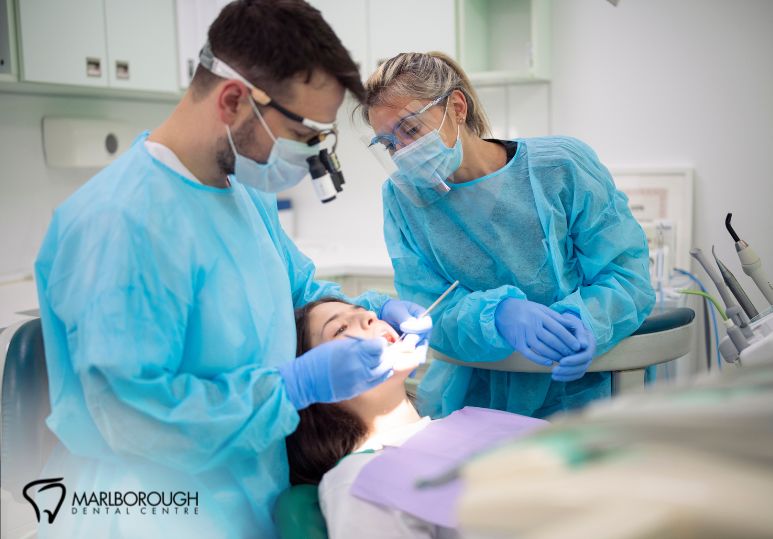Dental crowns are an excellent solution for restoring the function and appearance of damaged or weakened teeth. Once your crown is placed, it's important to take care of it properly to ensure its longevity and maintain your oral health. At Marlborough Dental Centre in Calgary, we want to help you protect your dental investment and keep your smile looking its best. In this blog, we’ll provide three essential tips for caring for your dental crown after placement.
1. Practice Good Oral Hygiene
While a dental crown itself can’t decay, the tooth underneath it is still vulnerable to decay and gum disease. That’s why maintaining excellent oral hygiene is crucial for protecting your crowned tooth and ensuring the surrounding gum tissue stays healthy. Following a consistent oral care routine will help you avoid potential complications and extend the life of your crown.
Brushing and Flossing
Brush your teeth twice a day with a soft-bristled toothbrush and fluoride toothpaste. Make sure to pay special attention to the area around the base of the crown, as plaque can easily build up along the gumline. Plaque accumulation can lead to gum irritation or inflammation, which could affect the stability of your crown over time.
Flossing is equally important, as it helps remove food particles and plaque between your teeth. When flossing around a crowned tooth, be gentle to avoid dislodging the crown. Instead of snapping the floss between your teeth, slide it carefully up and down along the sides of the tooth. Consider using a floss threader or water flosser to clean around hard-to-reach areas.
Regular Dental Check-Ups and Cleanings
Routine dental check-ups and professional cleanings are essential for keeping your crowned tooth in top condition. Your dentist will monitor the health of the tooth underneath the crown, ensuring that it remains strong and free from decay. During these visits, any early signs of issues such as gum inflammation or damage to the crown can be addressed before they worsen.
2. Avoid Hard or Sticky Foods
Although dental crowns are designed to be durable, they are not indestructible. Certain foods can pose a risk to your crown, especially if they are hard or sticky. Being mindful of what you eat can help prevent unnecessary wear, damage, or even dislodgement of the crown.
Hard Foods
Chewing on hard foods like ice, nuts, hard candies, or popcorn kernels can put excessive pressure on your crown and may cause it to crack, chip, or become loose. To protect your crown, avoid biting down directly on these items. If you enjoy eating foods like nuts or hard fruits, try cutting them into smaller pieces to minimize the strain on your crowned tooth.
Sticky Foods
Sticky foods such as caramel, taffy, and gum can latch onto your crown and pull it out of place. These foods can also become trapped around the base of the crown, leading to plaque buildup and potential decay. To avoid these problems, limit your consumption of sticky treats and opt for less adhesive snacks.
If you accidentally damage your crown while eating, don’t panic. Contact your dentist right away for an evaluation. Early intervention can often prevent more serious complications.
3. Address Teeth Grinding and Clenching
Bruxism, or the habit of grinding or clenching your teeth, can put significant pressure on your crown, leading to premature wear or damage. If you tend to grind your teeth at night or clench your jaw during the day, it’s important to address this issue to protect your dental crown and overall oral health.
Night guards
If you grind your teeth while sleeping, ask your dentist about a custom night guard. A night guard is a comfortable, protective device worn over your teeth to cushion the pressure from grinding and prevent damage to both your crown and natural teeth. Wearing a nightguard consistently can significantly reduce the risk of cracking or loosening your crown.
Stress Management
Teeth grinding and clenching are often linked to stress. Practicing stress management techniques, such as deep breathing exercises, meditation, or yoga, can help reduce the frequency of grinding. Additionally, being mindful of your habits during the day—such as clenching your jaw when you’re concentrating—can help prevent unnecessary pressure on your crown.
If you suspect that you’re grinding your teeth, talk to your dentist. They can provide personalized advice and recommend treatments to help protect your crown from damage.
Long-Term Care for Your Dental Crown
Taking care of your dental crown after placement is essential for maintaining its durability and ensuring the health of your natural tooth underneath. By practicing good oral hygiene, avoiding hard and sticky foods, and addressing any habits like teeth grinding, you can keep your crown in excellent condition for many years to come.
At Marlborough Dental Centre in Calgary, we are committed to helping you enjoy the benefits of a healthy, beautiful smile. If you have questions about your dental crown or need assistance with aftercare, our experienced team is here to provide personalized guidance and support. Contact us today to schedule a check-up and keep your dental crown in top shape.
FAQs
Q: What foods should I avoid with a dental crown?
A: Avoid hard foods like ice and nuts, and sticky foods like caramel and taffy, as they can damage or dislodge the crown.
Q: What should I do if my crown feels loose?
A: Contact your dentist immediately. A loose crown can lead to further damage if not treated promptly.
Q: What if my crown cracks or breaks?
A: If your crown cracks or breaks, contact your dentist for an evaluation. Early treatment can prevent further damage. Book your appointment today!




